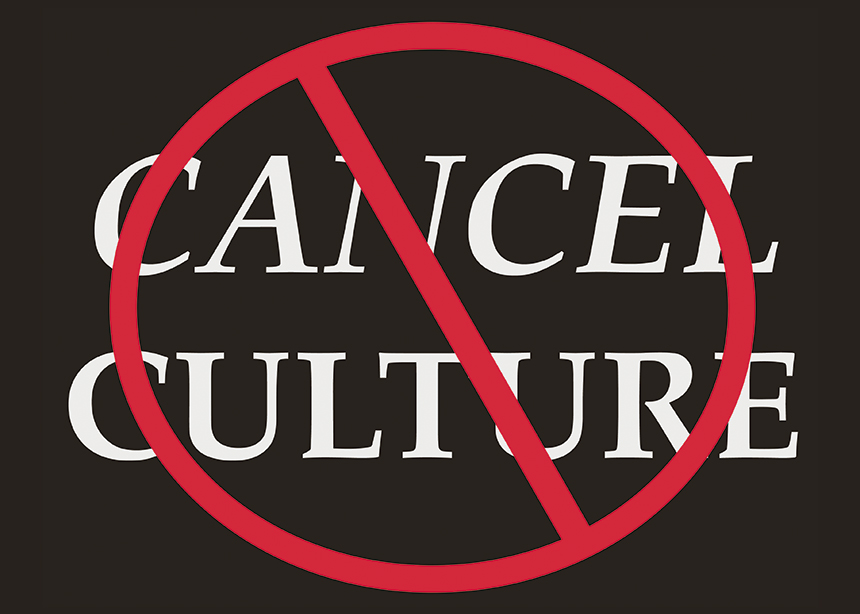At first I thought cancel culture was a good idea.
The phenomenon, which emerged a handful of years ago, refers to “ending (or attempting to end) an individual’s career or prominence to hold them accountable for immoral behaviour.” That’s according to University of Cambridge psychologist Rob Henderson.
Writing for Psychology Today, he says cancellers seek to “impose long overdue consequences for unacceptable behaviour.” These “consequences” can be anything from the loss of one or two current relationships to the destruction of an entire reputation—career, social network, and all.
The emergence of cancel culture in North America was only natural. The past two decades have included many important social-justice movements that brought serious injustices and harms to light, from the #MeToo movement and sexual misconduct to the Black Lives Matter movement. But awareness itself doesn’t always bring tangible change, so social justice advocates turned to cancelling to deliver results.
Cancel culture, Henderson says, gives “voice and influence to those with no other way to hold powerful figures accountable.” It can “act as a tool for social justice, instilling new values of equality and destroying a dangerous precedent.”
I share this desire to expose injustice and demand justice. But I find cancel culture’s method of doing so intellectually, socially and theologically problematic.
Aristotle’s slaves
I encounter cancel culture often in my classes at Canadian Mennonite University (CMU). When we were assigned an Aristotle reading in the first philosophy course I took, several students didn’t want to touch the text, given Aristotle’s support of slavery. At that point, I had no conception of Aristotle’s stance on slavery, or anything else. Fortunately, we did go on to work with the text anyway, and I valued learning where Aristotle fits into the course of philosophical thought that carries on today.
Acknowledging the parts of historically significant bodies of work by problematic figures gives us an opportunity for prime, productive, critical thinking. We are pushed to engage actively and thoughtfully with the text, discerning which ideas have shaped our world for better or for worse. We hold on to the ideas that carry timeless wisdom and goodness while understanding and rejecting the ideas that have caused harm. Rejecting these works altogether would deny us this opportunity. As a professor recently named it to me, this is the difference between “calling out” and “calling in.”
That said, the cancel culture that university students like me encounter most frequently is the cancellation of people who are still living. When surveyed about their experiences with cancel culture, a number of CMU students all told me they’d observed cancellation, whether of beloved celebrities or social acquaintances.
One student said she’d first heard of country musician Morgan Wallen because he’d been cancelled for making a racist comment in public. The student began listening to Wallen and still felt guilty about it a few years later.
Another student said that every person does indeed need to be held accountable for their wrongdoings no matter when they occurred. Still, this person said, in cases where an entire community is ready to move forward in relationship with a wrongdoer after the harm they’ve caused has been properly addressed, cancel culture too often prevents that.
Another student said that cancel culture is certainly effective, but that this isn’t a good thing.
I agree. The lifelong cancellation of a wrongdoer is neither humane nor productive.
The permanence of guilt
When we subject someone to lifelong punishment, we enact the belief that they cannot better themselves. This belief can be as harmful as the wrong committed in the first place. It means we see them as less than human, thus allowing them to be treated inhumanely. To be human is to have a conscience, which means having the potential for both bad and good, and the potential to change. To see the humanity in another person is to see them both as they are and as they could be. It means treating them with respect.
When we cancel individuals, we strip them of their humanity, believing them to be only what they are in that moment, with no possibility for growth. We rob them of the resources that could foster growth within them. In doing so, we ourselves fall short of our potential for active, thoughtful engagement, almost forcing a wrongdoer to confirm our mindless assumption of their permanent guilt.
Theologically, cancel culture ignores the concept of forgiveness. As Hannah Arendt, a 20th-century Jewish philosopher, writes in The Human Condition, Jesus is the best model of forgiveness. For Arendt, forgiveness at its most fundamental is not the unhealthy continuing of a relationship or the forgetting of a wrongdoing, but the recognition of the common humanity between the wrongdoer and the wronged. Our common humanity is our God-given capacity for doing wrong and right, for bad and good. Recognizing this means recognizing both the full extent of the harm caused, and the full potential of the wrongdoer to do right in the future. Jesus, Arendt says, practised this forgiveness constantly, and commanded his followers to do the same.
When we obey this command and practise forgiveness in this way, we allow ourselves and others to become as good as we can be, and we allow the world to become as good as we know it could be. We act in fully informed hope, and this action inspires others to believe and act in this same hope. We prevent individuals from abusing their positions of power, removing them from these roles when necessary, and we engage with the work of individuals who’ve done harm with this in mind, altogether dismissing their work when necessary. We allow ourselves to see them as something more than the wrongs they’ve committed. We treat both ourselves and them with the respect we deserve as humans, as Jesus did.
Lesson learned
Cancelling individuals exposes injustice. It names a wrongdoer’s actions as wrong and dissuades others from behaving similarly. Cancelling individuals doesn’t, however, produce justice. It doesn’t demonstrate to others how one can right their wrongs and begin living out the lesson they’ve learned. It doesn’t even give the wrongdoer the chance to try.
Those doing the calling out don’t get the chance to grapple with, and learn from, the excruciating co-existence of wrong and right, either. As a professor advised me, before allowing yourself to be swept up in the passion of calling out, pause, and listen to your body: “How does it feel standing on the edge?”
If we are attentive, patient and disciplined enough to see the potential for wrong and right in all things, then these moments on the edge are an opportunity to create a future in which these wrongs aren’t committed again.
The sexist, homophobic and racist beliefs, policies and actions we have long been accepting as a society must indeed be called out as unjust and harmful. They must indeed be transformed through a commitment to equality and respect. And if equality and respect are the principles guiding this entire societal renovation, our exposure and punishment of those who have committed these injustices and harms must reflect this, too. The consequences for doing wrong must foster doing right.









Leave a Reply
You must be logged in to post a comment.